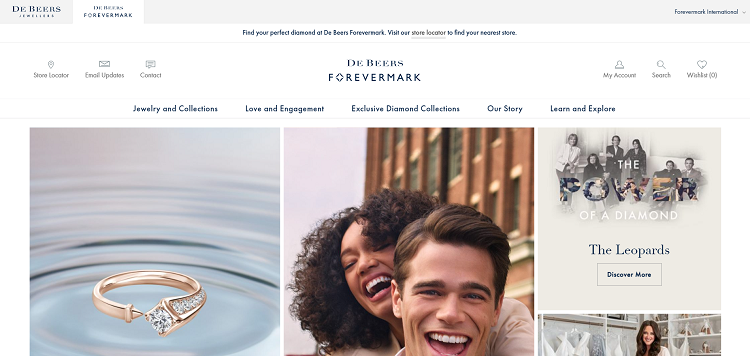This article has mentions of products from one or more companies, and I may receive compensation if you purchase those products following reading my recommendations.
You may know De Beers as the company responsible for our modern concept of the engagement ring ritual, and the invention of the often unrealistic yet glamorous two-months’-salary spending rule. Thanks to their monopolization of the international diamond supply for most of the 20th century, De Beers made a tidy profit, which served them well for a century and of course became a huge name in the process.
But in the face of increasing competition, De Beers made the decision in 2008 to expand into the retail sector and created the Forevermark brand. Today, Forevermark sits alongside other luxury brands such as Tiffany and Cartier, purporting to sell only the best 1% of diamonds.
But just how well does Forevermark stand up to its luxury market rivals? And is there any truth to the 1% claim?

Diamond quality
Splashed all over the Forevermark website is the claim that less than 1% of the world’s diamonds are eligible for selection as Forevermark diamonds, presumably based on rigorous criteria which rewards perfection in every one of the 4Cs to select only the best gems for sale.
This claim is a huge part of Forevermark’s marketing, and accounts for much of their popularity: the exclusivity supposedly offered by their brand is an excellent sales tactic. However, it’s disappointing to discover that the supposed rarity of a Forevermark diamond is, in fact, pretty standard.
To put it bluntly, the diamonds they sell are less-than-perfect. Their quality standards permit diamonds above an L color, allowing gems with a hint of yellow to slip through their at-first-glance rigorous criteria. Similarly, they sell gems with a second-best ‘Very Good’ cut grade.
These factors mean that for all Forevermark’s good marketing regarding the rarity of their diamonds, their diamonds are not in fact all that rare, and they are certainly not perfect.
Certification
When purchasing a diamond, it’s important to know that its grading is accurate, and its certification is legitimate. Most luxury brands will offer grading reports officiated by impartial external authorities such as GIA or AGS.
However, Forevermark takes an alternative route in choosing to grade its own diamonds with De Beer’s Forevermark Diamond Institutes. This in-house certification service is, according to the website, as rigorous as any other and world-class standard.
However, you might be setting yourself up for disappointment by trusting this certification. When you buy a diamond graded by an independent third-party, you receive a reliable certification of its value, giving you confidence in your purchase.
When the diamond is graded by the seller’s own institution, there’s always that additional layer of untrustworthiness, which can sour the whole process a little. It’s strange that Forevermark, with its luxury reputation, would choose to keep their grading in-house, and it can certainly raise some eyebrows – and some questions concerning reliability and quality.
Price
All these pitfalls make the price of Forevermark diamonds even more eye-watering. Because the truth is, with any luxury brand name, you’re always paying a premium for the label.
The price of Forevermark jewelry is, unsurprisingly, high, particularly when you consider the fact that you will potentially be receiving a diamond that is not the absolute best in terms of cut, clarity, color, and carat. Instead, you’ll be paying through your nose for the luxury associated with Forevermark, a brand that is not even as well-known as competitors such as Tiffany and Cartier because it doesn’t actually have ‘De Beers’ in the name.
Furthermore, it’s evidently possible to find diamonds as good as – or better than – Forevermark diamonds, using customization services such as those offered by Blue Nile, Whiteflash or James Allen. These cheaper online retailers offer diamonds with even higher grades than Forevermark diamonds, in equally beautiful bands and settings, and sometimes for a fraction of the cost.
Should I buy from Forevermark?
There’s no denying that Forevermark has a reputation for luxury and beauty. Their beautiful website and attractive taglines, as well as their association with the promise of romance and glamour offered by the De Beers Company, draw in many customers.
Ultimately, however, Forevermark’s prices are as high as they are because of the brand’s reputation and name, which is created largely by its excellent marketing tactics and historical grounding. The diamonds themselves are nothing special, and it would take a lot of labor to discern the truly perfect from the more ordinary, using selection criteria doubtless more rigorous than those applied by the brand itself.
Furthermore, their certification is perhaps unreliable and does not offer you, as a customer, much in the way of confidence in the product you have just spent thousands of dollars on.
If you’re looking for something of high quality with light performance images to back it up, then consider Whiteflash and the A Cut Above Diamonds.
